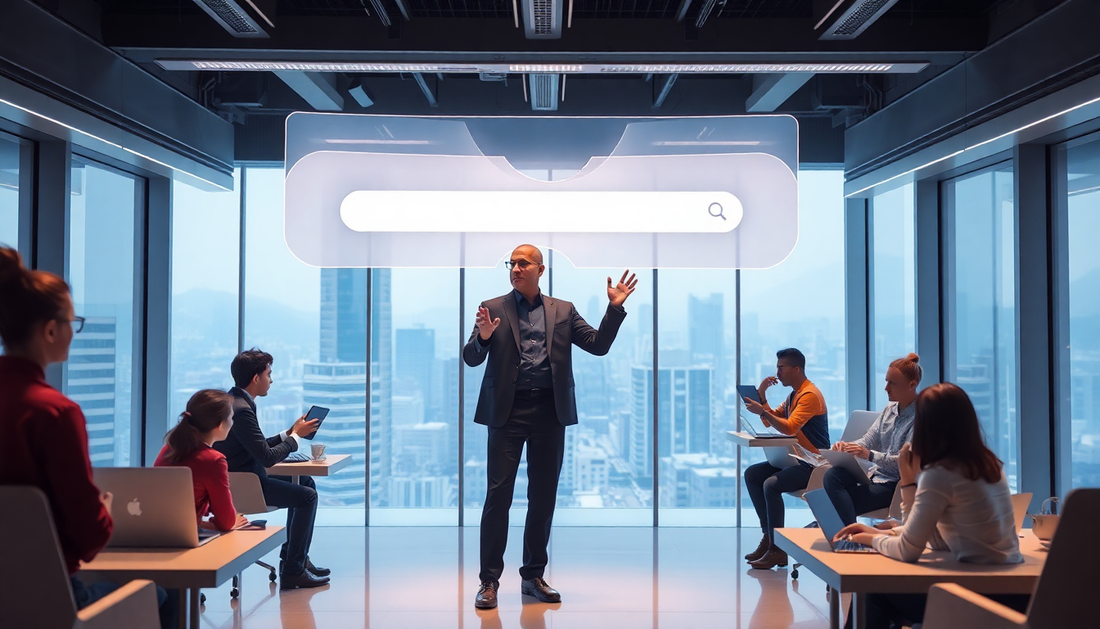
Google CEO: Search Will Change Profoundly In 2025
Share
In a recent interview, Google's CEO, Sundar Pichai, made a bold prediction that will have a significant impact on the future of search. He revealed that search as we know it will undergo a profound transformation by the year 2025, ushering in a new era of information discovery and retrieval.
The Shift Towards Conversational Search
Pichai emphasized that the traditional keyword-based search model is rapidly evolving, giving way to a more natural, conversational approach. "Users are increasingly seeking answers to their queries in a more conversational and intuitive manner," he explained. "They want search engines to understand the context and intent behind their queries, rather than just matching keywords."
This shift towards conversational search is driven by advancements in natural language processing (NLP) and machine learning. Pichai noted that Google's language models have become increasingly sophisticated, allowing them to comprehend the nuances and complexities of human language. "By 2025, we envision a search experience where users can engage in a back-and-forth dialogue, asking follow-up questions and receiving more contextual and personalized responses."
The Rise of Multimodal Search
Another significant change Pichai foresees is the integration of multimodal search capabilities. "In the coming years, search will no longer be limited to text-based inputs," he said. "Users will be able to leverage a combination of text, images, audio, and even video to find the information they need."
This multimodal approach will enable users to search for information in a more intuitive and visually-driven manner. For example, someone searching for a specific product could snap a photo of it and use that as the basis for their search, rather than typing in a textual description.
"Imagine being able to search for a recipe by uploading a photo of the dish you want to make," Pichai suggested. "Or finding information about a landmark by simply pointing your camera at it. This level of integration between different data modalities will fundamentally change how we interact with search engines."
The Importance of Personalization
Pichai also emphasized the growing importance of personalization in search. "By 2025, search will become increasingly tailored to the individual user, taking into account their preferences, search history, and even their location and device context."
This personalization will allow search engines to provide more relevant and useful results, catering to the unique needs and interests of each user. Pichai envisions a scenario where a user's search history and browsing patterns could inform the types of content and recommendations they receive, making the search experience more seamless and efficient.
"Imagine searching for a new pair of running shoes and having the search engine automatically surface options that align with your previous purchases, your fitness goals, and even the weather in your area," he said. "This level of personalization will be crucial in helping users find the information they need quickly and easily."
The Importance of Trust and Transparency
As search becomes more advanced and personalized, Pichai emphasized the importance of maintaining user trust and transparency. "As search engines become more powerful and influential in our daily lives, it's crucial that we prioritize trust and transparency," he said.
This means ensuring that search results are accurate, unbiased, and free from manipulation or misinformation. Pichai noted that Google is investing heavily in initiatives to combat the spread of fake news and to promote the visibility of authoritative and reliable sources.
"By 2025, we envision a search landscape where users can trust the information they're receiving, and where they have a clear understanding of how the search algorithms work and how their personal data is being used," Pichai said.
The Impact on Businesses and Marketers
The profound changes in search will also have a significant impact on businesses and marketers. Pichai highlighted the need for organizations to adapt their strategies to the new search landscape.
"Businesses will need to focus on creating high-quality, relevant content that aligns with the conversational and multimodal nature of search," he said. "They'll also need to invest in optimizing their websites and digital assets for these new search capabilities, ensuring that their products and services are easily discoverable and accessible."
Marketers, in particular, will need to rethink their approach to search engine optimization (SEO) and paid search advertising. "Traditional keyword-based strategies will become less effective as search becomes more contextual and personalized," Pichai warned. "Businesses will need to adopt a more holistic, user-centric approach to their digital marketing efforts."
The Importance of Adaptability
Pichai emphasized that the key to success in this rapidly evolving search landscape will be adaptability. "Businesses and marketers that are able to stay ahead of the curve and embrace these changes will be the ones that thrive in the years to come," he said.
He encouraged organizations to stay informed about the latest developments in search technology, to experiment with new approaches, and to be willing to pivot their strategies as needed. "The search landscape is going to look very different in 2025, and those who are able to adapt and innovate will be the ones who come out on top."
In conclusion, Pichai's predictions about the future of search point to a profound transformation that will have far-reaching implications for both users and businesses. By embracing the shift towards conversational, multimodal, and personalized search, organizations can position themselves for success in the years to come.
